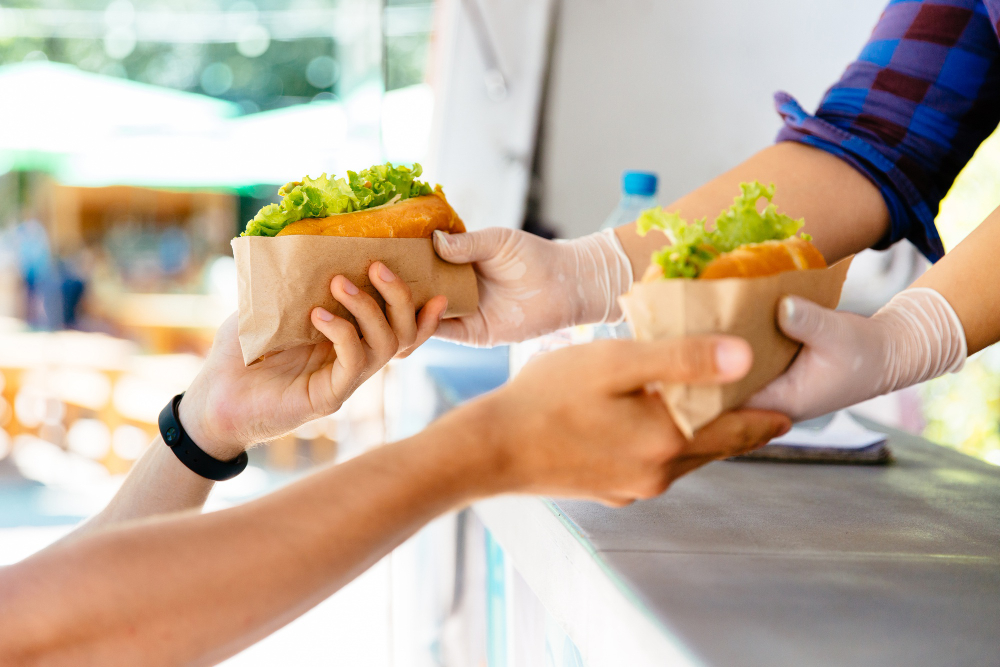
One of the best aspects of traveling is trying new foods and indulging a bit. While it’s okay to splurge and try new things, you probably don’t want to completely derail your diet.
Plus, if you’re constantly snacking on junk food during your trip, you’ll likely feel run down and won’t have enough energy to do everything you want to. So, how do you strike a balance? Here are our top tips for eating healthy as you travel.
[Related: Healthy Travel Checklist]
Before You Leave
Eating healthy while traveling starts before you leave. You can do several things pre-trip to ensure you're prepared for the road.
1. Pack snacks
Not only does packing your snacks help you eat healthier, but it also helps you save money. We suggest sticking with snacks high in protein and fiber which will help you stay full for longer. Some great snacks to throw in your bag include:
- Apples and bananas
- Protein bars
- Single-serving of hummus and crackers
- String cheese
- Hard-boiled eggs
- Peanut butter sandwiches on whole-grain bread
- Grapes
[Related: Heart Healthy Snack Review]
2. Bring a water bottle

Staying hydrated is just as important as eating healthy. By staying hydrated during your travels, you’ll have more energy throughout the day, and you’ll be less likely to turn to unhealthy snacks or sugary, fruity drinks. Plus, you’ll save money, as you won’t be tempted to buy something to sip on everywhere you go.
We suggest packing a reusable water bottle that you can easily tuck into your day bag to carry with you everywhere. This will be helpful for you and the planet since you won’t have to purchase single-use plastics!
If you’re traveling somewhere where you can’t drink the local tap water, throw some water purification tablets in your bag, and you’ll be good to go.
3. Research your destination
As you’re planning out your sightseeing activities and daily adventures, don’t forget to do some research into local restaurants and cafes with healthy food options, especially if you have dietary restrictions. When hunger strikes and you’re in a new city, it can be tempting to walk into the first restaurant you see for a burger and some fries.
It’s easier than ever to find healthy options in most areas. If you’re vegetarian or vegan, you can check out the Happy Cow for restaurant recommendations in your area.
4. Book an accommodation with a kitchen
Sure, eating out while traveling is a ton of fun, but if you’re doing it for every meal, it can quickly take a toll on your wallet and your belly. Instead, try to book an accommodation with a kitchen on your next trip. With hotels, your kitchen options can be limited so AirBnb or VRBO might be the better place to look for accommodations.
5. Pick up food for the plane ride
Airplane meals are typically lackluster, and they’re not usually nutritionally dense. Try to buy or pack your lunch or dinner before you board the plane to avoid eating unhealthy airplane food.
After You Arrive
Now that you know what to do before your trip let’s discuss what to do when you arrive.
1. Be smart with street food

Whether it’s a hot dog in NYC, tacos in LA or chili crabs in Singapore, street food is a convenient and delicious insight into the local food scene but isn’t always very healthy.
If you’re tempted to grab street food, consider your options if there’s more than one stall and feel free to ask for modifications. For example, if you’re getting street falafel, you can ask them to load up on the veggies and go light on the sauces. You can also share your food rather than eating the whole thing by yourself.
2. Stop by a supermarket
Stopping by a local supermarket isn’t just a great way to eat healthily and save money, but it’s also a great way to experience the culture! Supermarkets in other countries are often set up quite differently from the ones back home and have many different food items you normally wouldn't see.
This is also a great chance to test out your local language skills!
Your time in this new location is limited so you don’t want to deal with complicated recipes for hours a day. Try to shop for items that are easy to prepare. And, don’t forget to load up on healthy snacks.
3. Leave room in your schedule for healthy eating and cooking

While your days are likely going to be filled with activities and sightseeing, try to leave a bit of room for cooking and healthy eating if possible. This doesn’t mean cooking from scratch every meal. You can make something easy to eat throughout the week.
For example, you can make a quinoa salad with beans and veggies and store it for the week, or you can cook some chicken breasts and steam some vegetables, so you have a nice homecooked meal waiting for you after a long day of exploring. If you’re looking for a healthy breakfast, you can make some overnight oats to enjoy in the morning.
4. Stay hydrated
We mentioned this before, but don’t forget to stay hydrated when on the road! Bring your water bottle with you wherever you go.
5. Eat foods that help you sleep
While many of us go on vacation with the intention to have a bit of rest, the combination of exploring, excitement, and jet lag can often lead to trouble sleeping. This can be a problem since exhaustion and lack of sleep can make you overeat.
Try to incorporate foods that help with sleep, such as almonds, walnuts, turkey, kiwis, or chamomile tea. You can also prepare by picking up our travel bundle.
At Restaurants
Dining out can be the downfall of many well-intentioned travelers. Here are some tips to keep your healthy eating on track.
1. Share when possible
Restaurant portion sizes tend to be huge, so it's very easy to overindulge, especially while traveling because 1. The food tastes great and 2. We’ll only be here once right?
To ensure you don’t miss out on all the great food but don’t overindulge, try to share plates whenever possible. Remember, if you’re hungry, you can always order more! You’ll probably be surprised at how many times you can split a meal at a restaurant and still leave feeling satisfied.
2. Choose carefully
Restaurants and convenience stores have more healthy options than ever before, so with a bit of looking around, you can have a healthy, satisfying meal or snack.
[Related: 26 Foods That Reduce Bloating]
Bottom Line
While it might take a little more thought and isn’t always the absolute most convenient option, healthy eating while you travel is totally doable. And it doesn’t take nearly as much effort as you think. Just a few small steps will go a long way.
This article is provided for informational purposes only and is not intended to be used as medical advice. If you have immediate concerns about your health, please seek the help of your physician.
*These statements have not been evaluated by the Food and Drug Administration. This product is not intended to diagnose, treat, cure or prevent disease.
© 2022 Best in Nature All rights reserved




Validate your login
Sign In
Create New Account